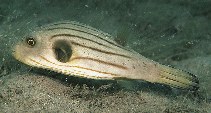| Family: |
Tetraodontidae (Puffers), subfamily: Tetraodontinae |
| Max. size: |
31 cm TL (male/unsexed) |
| Environment: |
reef-associated; brackish; marine; depth range 2 - 20 m |
| Distribution: |
Western Pacific: Borneo, Philippines, and northwest Australia to Samoa, north to the Ryukyu Islands, south to New South Wales, Australia and Tonga. |
| Diagnosis: |
Dorsal spines (total): 0-0; Dorsal soft rays (total): 9-11; Anal spines: 0-0; Anal soft rays: 9-10. Body covered with prickles. Many longitudinal dark stripes on body, although the stripes sometimes faint (Ref. 559).
Description: Characterized further by brownish to greenish grey dorsally, whitish to pale yellowish ventrally; short snout, 1.9-2.3 in head length; bony interorbital width 2.4-3.0 in head length; rounded caudal fin, length 2.2-3.2 in SL (Ref. 90102). |
| Biology: |
Inhabits muddy substrates, usually shallow coastal slopes to about 20 meters depth and in shallow estuaries (Ref. 48637). Occurs in estuaries, sheltered reef flats, and lagoons to a depth of more than 17 m. Common in seagrass beds and sandy areas; juveniles found among mangroves (Ref. 1602). Benthopelagic (Ref. 58302). |
| IUCN Red List Status: |
Least Concern (LC); Date assessed: 10 June 2009 Ref. (130435)
|
| Threat to humans: |
harmless |
Source and more info: www.fishbase.org. For personal, classroom, and other internal use only. Not for publication.
